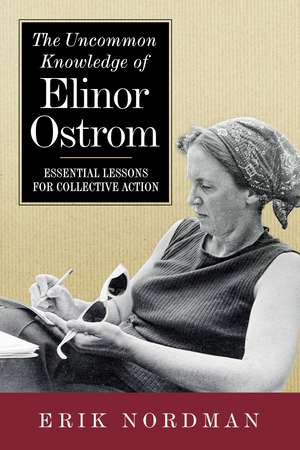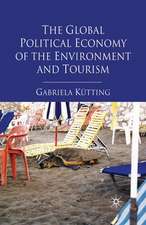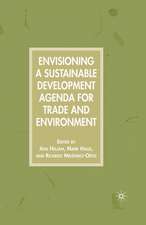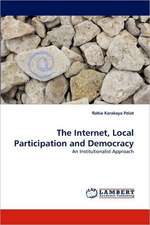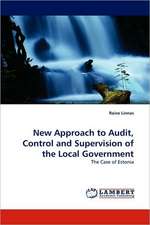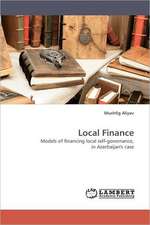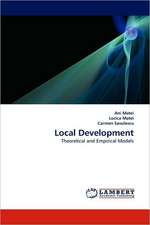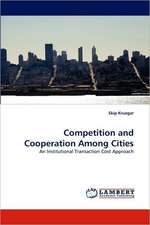The Uncommon Knowledge of Elinor Ostrom: Essential Lessons for Collective Action
Autor Erik Nordmanen Limba Engleză Paperback – 8 iul 2021
In the 1970s, the accepted environmental thinking was that overpopulation was destroying the earth. Prominent economists and environmentalists agreed that the only way to stem the tide was to impose restrictions on how we used resources, such as land, water, and fish, from either the free market or the government. This notion was upended by Elinor Ostrom, whose work to show that regular people could sustainably manage their community resources eventually won her the Nobel Prize. Ostrom’s revolutionary proposition fundamentally changed the way we think about environmental governance.
In The Uncommon Knowledge of Elinor Ostrom, author Erik Nordman brings to life Ostrom’s brilliant mind. Half a century ago, she was rejected from doctoral programs because she was a woman; in 2009, she became the first woman to win the Nobel Prize in Economics. Her research challenged the long-held dogma championed by Garrett Hardin in his famous 1968 essay, “The Tragedy of the Commons,” which argued that only market forces or government regulation can prevent the degradation of common pool resources. The concept of the “Tragedy of the Commons” was built on scarcity and the assumption that individuals only act out of self-interest. Ostrom’s research proved that people can and do act in collective interest, coming from a place of shared abundance. Ostrom’s ideas about common resources have played out around the world, from Maine lobster fisheries, to ancient waterways in Spain, to taxicabs in Nairobi. In writing The Uncommon Knowledge of Elinor Ostrom, Nordman traveled extensively to interview community leaders and stakeholders who have spearheaded innovative resource-sharing systems, some new, some centuries old. Through expressing Ostrom’s ideas and research, he also reveals the remarkable story of her life.
Ostrom broke barriers at a time when women were regularly excluded from academia and her research challenged conventional thinking. Elinor Ostrom proved that regular people can come together to act sustainably—if we let them. This message of shared collective action is more relevant than ever for solving today’s most pressing environmental problems.
In The Uncommon Knowledge of Elinor Ostrom, author Erik Nordman brings to life Ostrom’s brilliant mind. Half a century ago, she was rejected from doctoral programs because she was a woman; in 2009, she became the first woman to win the Nobel Prize in Economics. Her research challenged the long-held dogma championed by Garrett Hardin in his famous 1968 essay, “The Tragedy of the Commons,” which argued that only market forces or government regulation can prevent the degradation of common pool resources. The concept of the “Tragedy of the Commons” was built on scarcity and the assumption that individuals only act out of self-interest. Ostrom’s research proved that people can and do act in collective interest, coming from a place of shared abundance. Ostrom’s ideas about common resources have played out around the world, from Maine lobster fisheries, to ancient waterways in Spain, to taxicabs in Nairobi. In writing The Uncommon Knowledge of Elinor Ostrom, Nordman traveled extensively to interview community leaders and stakeholders who have spearheaded innovative resource-sharing systems, some new, some centuries old. Through expressing Ostrom’s ideas and research, he also reveals the remarkable story of her life.
Ostrom broke barriers at a time when women were regularly excluded from academia and her research challenged conventional thinking. Elinor Ostrom proved that regular people can come together to act sustainably—if we let them. This message of shared collective action is more relevant than ever for solving today’s most pressing environmental problems.
Preț: 223.48 lei
Nou
Puncte Express: 335
Preț estimativ în valută:
42.76€ • 45.73$ • 35.65£
42.76€ • 45.73$ • 35.65£
Carte disponibilă
Livrare economică 27 martie-10 aprilie
Livrare express 12-18 martie pentru 27.92 lei
Preluare comenzi: 021 569.72.76
Specificații
ISBN-13: 9781642831559
ISBN-10: 1642831557
Pagini: 256
Ilustrații: 30 photos
Dimensiuni: 152 x 229 x 20 mm
Greutate: 0.41 kg
Editura: Island Press
Colecția Island Press
ISBN-10: 1642831557
Pagini: 256
Ilustrații: 30 photos
Dimensiuni: 152 x 229 x 20 mm
Greutate: 0.41 kg
Editura: Island Press
Colecția Island Press
Notă biografică
Dr. Erik Nordman is Professor of Natural Resources Management and Adjunct Professor of Economics at Grand Valley State University, Michigan, and an Affiliate Scholar at Indiana University’s Ostrom Workshop. Nordman has written on a wide variety of environmental topics, from urban stormwater management and land preservation to renewable energy. His work has also appeared in mass-market publications such as Quartz, The Conversation, and Bridge (a Michigan public affairs magazine). Nordman holds an M.S. in forest ecosystem management and a Ph.D. in natural resource policy and economics, both from the SUNY College of Environmental Science and Forestry, Syracuse University. He served as a Fulbright Scholar and visiting professor at Kenyatta University in Nairobi, Kenya, 2012-13. His publications are available at: https://works.bepress.com/erik_nordman/.
Cuprins
Acknowledgments
Chapter 1. What's So Tragic About the "Commons"?
Chapter 2. Los Angeles Groundwater
Chapter 3. Maine's Lobster Gangs
Chapter 4. Spain's Ancient Water Court
Chapter 5. Institutions for Collaborative Forest Management
Chapter 6. Governing the Climate Commons
Chapter 7. Voluntary Environmental Programs
Chapter 8. Commons in Space
Chapter 9. Commons in the Digital World
Chapter 10. A Nobel for Institutions and a Pathbreaking Life
Notes
About the Author
Index
Chapter 1. What's So Tragic About the "Commons"?
Chapter 2. Los Angeles Groundwater
Chapter 3. Maine's Lobster Gangs
Chapter 4. Spain's Ancient Water Court
Chapter 5. Institutions for Collaborative Forest Management
Chapter 6. Governing the Climate Commons
Chapter 7. Voluntary Environmental Programs
Chapter 8. Commons in Space
Chapter 9. Commons in the Digital World
Chapter 10. A Nobel for Institutions and a Pathbreaking Life
Notes
About the Author
Index
Recenzii
"An intriguing exploration of pioneering research in natural resource management and the economist who led it."
“Erik Nordman’s book is a wonderful read. It explains a theory in simple words, which the author of this review understood (he believes) easily. It tells the story of how an idea came into being, and how it became a theory that can change the world. The book is a must-have for students and professors and scientists, and for citizens, too. It is an important text. It is beautiful.”
“A fascinating overview of the groundbreaking ideas about the governance of the commons developed by Elinor Ostrom, interspersed with a subtle, but enlightening narrative of her life and career …. It would appeal to those seeking a basic introduction to this great scholar, her novel and enduring ideas and the continued relevance they have for the many pressing challenges of resource governance we face today.”
"Expertly researched and thoughtfully presented rendition of an intelligent, persevering, and insightful woman's contribution to economic studies and behavioral science. Highly recommended, especially for public and college library collections."
"Are humans destined to overrun our resources? Erik Nordman, channeling the work of the Nobel Prize-winner Elinor Ostrom, persuasively argues no. Nordman provides a framework for how we can overcome our encroaching environmental crises, and by drawing on real-world examples, he leaves the reader with an increasingly elusive attitude—optimism."
"Part biography and part theoretical exposition, this book is an accessible, richly nuanced, and yes, entertaining account of Lin Ostrom’s life and research programs."
"A scholarly life like Elinor Ostrom’s is not easily distilled into a single volume, but Erik Nordman does so ably. Reviewing key lessons gleaned from her work around the world, he makes Lin’s journey leap off the page through interviews, field work, and engaging first-person encounters."
Descriere
Fifty years ago, conventional thinking among economists and environmentalists was that depletion of natural resources could only be prevented through the free market or government regulation. This notion was upended by Elinor Ostrom, whose work to show that regular people could sustainably manage their community resources won her the Nobel Prize in Economics. Ostrom’s revolutionary proposition fundamentally changed how we think about environmental governance.
In The Uncommon Knowledge of Elinor Ostrom, author Erik Nordman brings to life Ostrom’s brilliant mind. Ostrom’s research proved that people can and do act in collective interest, and her ideas about common resources have played out around the world, from Maine lobster fisheries to taxicab use in Nairobi. Ostrom broke barriers at a time when women were regularly excluded from academia. Her message of shared collective action is more relevant than ever for solving today’s most pressing environmental problems.
In The Uncommon Knowledge of Elinor Ostrom, author Erik Nordman brings to life Ostrom’s brilliant mind. Ostrom’s research proved that people can and do act in collective interest, and her ideas about common resources have played out around the world, from Maine lobster fisheries to taxicab use in Nairobi. Ostrom broke barriers at a time when women were regularly excluded from academia. Her message of shared collective action is more relevant than ever for solving today’s most pressing environmental problems.
